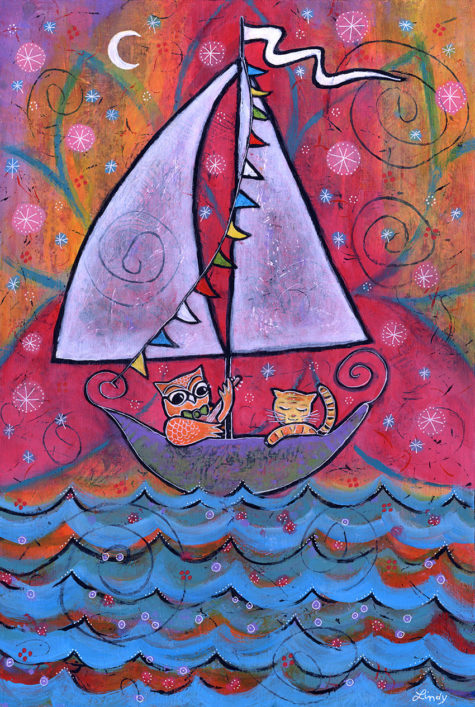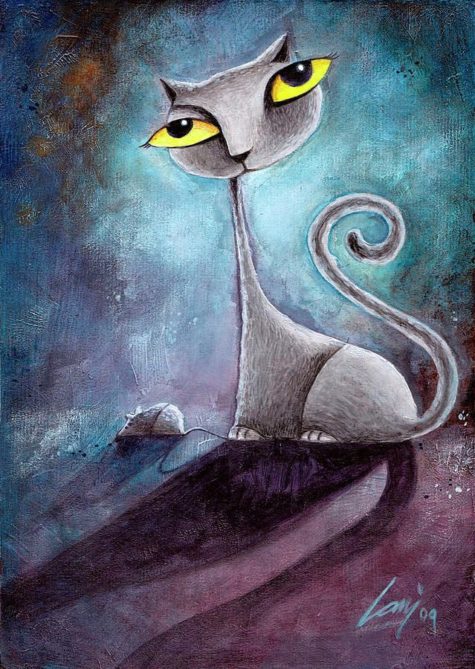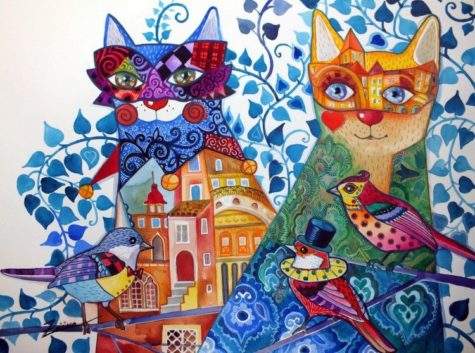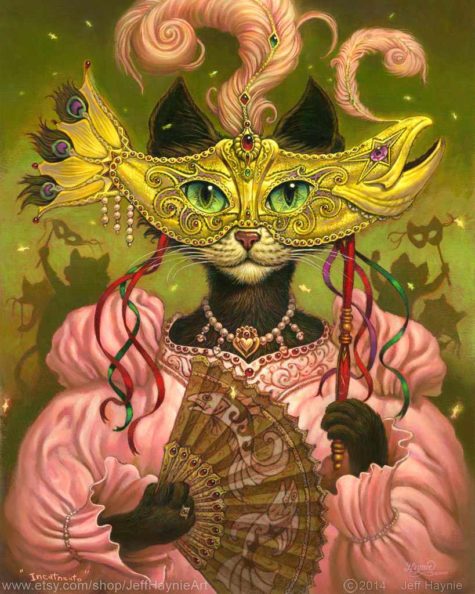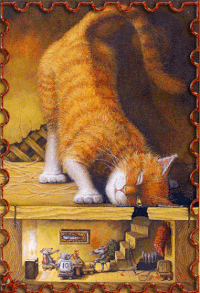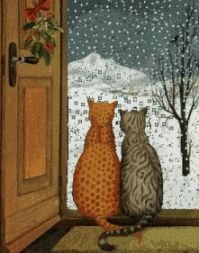Mouse
The Bronze Ring
Once upon a time there lived a king whose palace was surrounded by a spacious garden. In spite of good soil and many gardeners, the garden never grew trees or plants, fruit or flowers. The king was in despair. One day, a wise old man told the king “”Your gardeners do not understand their business; they don’t know how to cultivate gardens because their fathers were carpenters and cobblers. You need a gardener whose father and grandfather were gardeners before him. Then your garden will be full fruit and flowers.”
The King sent messengers to every town and village in the land to look for a gardener father and grandfather had been gardeners before him. For forty days they searched until the found such a gardener. The man protested that he was poor and owed money, but the king gave him new clothes and paid his debts and insisted he become the royal gardener. The man had no difficulty in making the royal garden produce fruit and flowers and after a year the king showered gifts on him.
The gardener had a handsome and well-mannered son whose job it was to take the best fruit to the king and the choicest flowers to the king’s sixteen year old daughter, the princess. The king considered it time his princess should marry and he had chosen the prime minister’s son to be her husband.
“I will never marry the prime minister’s son,” protested the princess, “I love the gardener’s son.”
The king became very angry and then very sad. He declared that such a husband was not worthy of his daughter, but the Princess was determined to marry the gardener’s son. So the king consulted his ministers.
“This is what you must do,” they told him, “To get rid of the gardener you must send both suitors to a very distant country. The one who returns first shall marry your daughter.”
The King followed this advice. He gave the minister’s son a splendid horse and a purse full of gold. He gave the gardener’s son an old lame horse and a purse full of copper coins. Everyone thought the gardener’s son would never come back from his journey.
The day before they started the Princess met her lover and said, “Take this purse full of jewels and make the best use you can of them for love of me. Come back quickly and demand my hand.”
The two suitors left the town together, but the minister’s son went off at a gallop on his good horse was soon far out of sight. After some days he reached a fountain beside which sat a ragged old woman.
“Good morning young traveler,” said the old woman, but the minister’s son didn’t reply. “Pity me, young man,” she said, “I am dying of hunger; I’ve been here three days and no one has given me anything.”
“Go away, old witch,” replied the minister’s son, “I can do nothing for you.” With that he went on his way.
Much later that day the gardener’s reached the fountain upon his old lame horse.
“Good-day, young traveler,” said the beggar-woman, “Have pity on me for I’ve eaten nothing these past three days.”
“Good-day, good woman,” replied the gardener’s son, “Take my purse and mount behind me, for your legs can’t be very strong.”
The old woman mounted behind him and in this style they reached the chief city of a powerful kingdom. The minister’s son was lodged in a grand inn while the gardener’s son and the old woman dismounted at the inn for beggars. The next day the gardener’s son heard a great noise in the street, and the King’s heralds passed, and crying: “The King is old and infirm. He will give a great reward to whoever will cure him and give him back the strength of his youth.”
The old beggar-woman said to the gardener’s son, “Go out of the town by the south gate, and there you will find three little dogs of different colors: one white, one black and one red. You must kill them and then burn them separately, and gather up the ashes. Put the ashes of each dog into a bag of its own color, then go before the door of the palace and cry out ‘A celebrated physician has come to cure the king and give him back the strength of his youth.’ The king’s physicians will call you an impostor before you can see the king himself. You must then demand as much wood as three mules can carry, and a great cauldron, and must shut yourself up in a room with the king. When the cauldron boils you must throw him into it and let him cook until his flesh is completely separated from his bones. Then arrange the bones in their proper places and throw the ashes out of the three bags over the bones. The King will come back to life as a young man. For your reward you must demand the bronze ring which has the power to grant you everything you desire.”
The gardener’s son followed the old woman’s directions. First he killed and burnt the three dogs and gathered up their ashes. Then he presented himself to the palace as a physician. When he won admittance to see the king he carried out the old woman’s instructions and from the boiled bones the king rose up as a young, vigorous man. The king offered him many treasures, but the gardener’s son insisted on the magical bronze ring.
After bidding farewell to the old woman, the gardener’s son instructed the bronze ring to prepare a splendid ship of silver and gold in which to continue his journey, a cargo of precious jewels and a crew of fine handsome sailors. In this ship he sailed to a great town and established himself in a fine palace. After a few days he met his rival, the minister’s son. The minister’s son had run out of money and was reduced to cleaning the streets of manure. He did not recognize the gardener’s son and the gardener’s son feigned ignorance also.
The gardener’s son told him, “You are a stranger, but I will help you. I will give you a ship to carry you home, but you must accept it willingly whatever its condition.”
The minister’s son agreed and presently they both reached the palace where the palace servants had him strip. The gardener’s son ordered the ring to become red hot and he branded his rival’s back with it. He then ordered the ring to prepare a ship of black and rotten timbers with ragged sails and an ugly, sickly crew and a cargo of filth. In this dreadful vessel the minister’s son arrived home first and, in spite of his condition, the king began to prepare for the wedding. The princess was in despair.
The next daybreak, a wonderful ship of silver and gold sailed into the harbor. The sailors were handsome and the captain appeared to be a prince. The king immediately welcomed the ship’s captain to the palace as his guest for however long the man remained in the capital.
“My daughter is about to be married,” said the king, “will you give her away?”
“I shall be charmed, sire,” replied the young captain, but when he saw the minister’s son he exclaimed “how can you marry your daughter to a man such as that?”
“He is my prime minister’s son!”
“What does that matter? I cannot give your daughter away. The man she is betrothed to is one of my servants.” The king doubted this, but the young captain went on, “I met him in a distant town reduced to sweeping muck from the streets and I engaged him as one of my servants out of charity.”
“This is impossible!” cried the king.
“Do you wish me to prove what I say?” asked the young captain, “This young man returned in a vessel which I fitted out for him, a filthy and unseaworthy ship crewed by crippled sailors.”
“It is quite true,” said the king.
“It is false,” cried the minister’s son. “I do not know this man!”
“Sire,” said the young captain, “You will find my brand on his back.”
The minister’s son admitted the truth of the matter and went away in disgrace. The young captain revealed himself as the gardener’s son and that very day he married the princess.
The young couple were happy and the king was pleased with his new son-in-law, but presently the captain of the golden ship found it necessary to take a long voyage. In the outskirts of the capital there lived an old magician who had studied the dark arts. He knew that the gardener’s son had only succeeded because of the genie who obeyed the bronze ring and he wanted the ring for himself.
The magician went down to the sea-shore and caught some pretty little red fishes. Pretending to be a peddler, he knocked on the princess’s door and ask if she wished to buy the pretty fish.
“What will you take for your fish?” she asked him.
“A bronze ring,” replied the peddler.
The princess didn’t know the value of her husband’s bronze ring, which he had left safely under his pillow, so she gave it to the peddler in exchange for the fishes. Hardly had the magician reached home than he commanded the ring to turn the golden ship to black wood and turn the handsome crew to hideous swarthy men and make the precious cargo into black cats. The ring obeyed him instantly and the young captain knew immediately that his ring had been stolen.
In this ship he sailed miserably from shore to shore, but wherever he went people laughed at him and his ship. Soon his poverty was so great that he and his crew and the poor black cats had nothing to eat but herbs and roots. After sailing for a long time he reached an island inhabited by mice. The captain landed upon the shore and the hungry black cats set upon the mice at once.
The queen of the mice held a council, “These cats will eat every one of us if the captain of the ship does not shut the ferocious animals up. Let us send a deputation of our bravest mice at arms.”
When the mice at arms found the young captain, they said, “Go away quickly from our island or we shall perish, every mouse of us.”
“Upon one condition,” replied the young captain, “You must first bring me back a bronze ring which some clever magician has stolen from me. If you do not do this I will land all my cats upon your island, and you shall be exterminated.”
The mice were dismayed. “What is to be done?” said the Queen. “How can we find this bronze ring?” She held a new council, calling in mice from every quarter of the globe, but nobody knew where the bronze ring was. Suddenly three mice arrived from a very distant country. One was blind, the second lame, and the third had no ears.
“We come from a far distant country,” said the newcomers, “An old sorcerer has the bronze ring and keeps it in his pocket by day and in his mouth by night.”
“Go and take it from him, and come back as soon as possible,” ordered the queen, “Else the cargo of black cats will eat us all.”
The three mice set sail for the magician’s country. When they reached the capital they ran to the palace, leaving the blind mouse on the shore to take care of the boat. That night they found the wicked old man asleep with the bronze ring into his mouth. The mouse with no ears dipped her tail in a pepper-pot and held it to the sorcerer’s nose. The sorcerer sneezed and the ring shot out of his mouth, but he did not wake. The lame mouse snatched up the ring and the three mice set sail back to their own land.
Naturally they began to talk about the bronze ring.
“Which of us deserves the most credit?” they asked each other.
“I do,” said the blind mouse, “for without my watchfulness our boat would have drifted away to the open sea.”
“I do,” cried the mouse with no ears, “did I not cause the ring to jump out of the man’s mouth?”
“I do,” cried the lame mouse, “for I ran off with the ring.”
The three mice began to quarrel and in the argument the bronze ring fell into the sea.
“How are we to face our queen,” said the three mice “when we have lost the ring and condemned our people to be utterly exterminated by black cats?”
So they landed on the first island they came to. The lame mouse and the mouse with no ears went to find nuts and roots, leaving their blind sister on the beach and she wandered sadly, eating whatever fish were washed up by the tide. Suddenly she let out a cry as her teeth bit something hard. It was the bronze ring, which had been swallowed by a fish. Joyfully, the three mice set sail for their own island and arrived just in time for the young captain was about to land his full cargo of hungry black cats to eat all the mice. With his ring returned, he turned his ship back to silver and gold, his crew back to handsome sailors and the hungry black cats became precious jewels once more.
The captain immediately sailed for home and took his revenge on the magician who had tricked the princess into giving over the ring. He seized the magician and tied him to the tail of a wild ass. The ass was set loose outside the city and dragged the magician behind him, breaking him utterly on the hard ground.
Found at: Moggy Cat
A Cat and Mouse Story
A cat once became such good friends with a mouse that she invited the mouse to live with her. The mouse agreed to move in and to share with the housekeeping. However they agreed not to leave the house each without the other unless by mutual agreement. “We must provide for the winter or else go hungry,” said the Cat, “but it is too dangerous for you to go looking for food in case you run into a mouse-trap.”
The cat’s advice was followed and they bought a little pot of fat, but they did not know where to put it. After a long discussion, the Cat said, “We can hide it safely in a corner of the church where no-one will disturb it. We won’t touch it until we need it.”
So they hid the little pot of fat in the church, but it wasn’t long before the cat had a great longing to lick some fat. She said to the Mouse, “My cousin has just had a little son, white with brown spots, and she wants me to be the godmother. I will go to the christening while you look after the house – it would be dangerous for you to come with me as the other cats would surely eat you!”
“Certainly,” replied the Mouse, “and when you eat anything good, think of me. If possible, I should very much like a drop of the red christening wine.”
But the Cat had no cousin, and had not been asked to be godmother. She went straight to the church and licked the top off the little pot of fat. Then went walking and sunning herself on the roofs of the town, licking her lips whenever she thought of the little pot of fat. When evening came, she returned home.
“Did you have an enjoyable day?” the mouse asked her.
“Indeed,” said the cat, “It all went very well.” And of course, that was the truth.
“What was the child’s name?” asked the mouse.
“Top Off,” replied the cat dryly.
“What a curious name!” exclaimed the mouse, “Is it a traditional name in you family?”
“What’s odd about the name?” the cat asked, blinking, “It’s no more curious than ‘Breadthief’ as your godchild is called.”
Soon after, the cat had another great longing for some fat and she once more asked the mouse to take care of the house, “I have been asked a second time to be a godmother, and of course I cannot refuse as the child has a white ring around its neck.”
The kind mouse agreed and the untruthful cat slunk under the town wall to the church where she ate up half of the pot of fat. “Nothing tastes better than what one eats by oneself,” she said, greatly pleased with her day’s work. Then she went sunning herself on the town roofs before returning home.
“What was this child named?” asked the mouse.
“Half Gone,” answered the cat.
“Halfgone?!” exclaimed the mouse, “What a name! Why I have never heard such a name in my life.”
Soon after, the cat once more had a great longing for some fat and she said to the mouse, “All good things come in threes and I have been asked to be godmother to my cousin’s third child as well. It is coal black and has snow white paws, but not a single white hair on its body. Such a thing only happens once in two years, so you will let me go out?”
“Topoff! Halfgone!” said the mouse, “Such curious names and they make me very thoughtful.”
“Oh, you sit here at home in your dark grey coat and your long tail,” said the cat, “and it makes you fanciful. That comes of not going out in the day!”
The mouse cleaned and swept the house while the cat was gone, but the untruthful cat ate up every last bit of the fat and said, “When it is all gone one can be at rest” before returning home sleek and satisfied.
“And what did they name this child?” asked the mouse, “Something as curious as the others?”
“It won’t please you any better,” the cat told her, “they called him Clean Gone.”
“Cleangone!” exclaimed the mouse, “Why don’t believe such a name exists! Cleangone indeed! What can it mean?”
The mouse shook her head and curled up to sleep. From that time one, no-one asked the cat to be godmother, but when the winter came and there was no food to be got outside, the mouse remembered their precious pot of fat safely hidden in the church and said, “Come, cat, let’s go to our pot of fat – it will taste very good.”
“Indeed,” answered the Cat, “it will taste as good to you as if you stretched your thin tongue out of the window,” meaning that empty air has no taste at all.
When they reached the church, they found the pot in its place, but quite empty and the mouse guessed what had been happening each time the cat had gone to a christening.
“Now I know what has happened, you false friend!” she cried, “First you ate the top off, then half of it gone and then …”
“be silent!” hissed the cat, “Another word and I will eat you up as well.”
But the word “Cleangone” was already on the poor mouse’s tongue, and scarcely was it out than the cat pounced on her and swallowed her whole.
“All gone,” said the cat to herself. You see that is the way of the world.
Found at: Moggy Cat
The Priceless Cats
This is an Italian version of the 12th-century British folk tale, “Dick Whittington and His Cat”, with a somewhat different ending.
Among the ancient Romans there was a proverb that those who are greedy never have enough, and since the Romans were Italians, the proverb still holds true. In the golden city of Venice they tell a tale that proves this time-old saying.
There once lived in the city by the sea two merchants who were neighbors. Both were rich. Both had grand palaces on the green, shimmering canal, with proud gondolas tied to cinnabar-and-yellow-striped poles. And both had lovely young children who were friendly and played with one another. As for the merchants, one was as different from the other as a black pebble from a shining ruby. One was hard and sharp and greedy, wanting whatever he saw, whether he needed it or not, while the other was generous and good, working to help not only himself but others as well. The two merchants knew each other and spoke to each other, but when it came to business, Mr. Greedy-Wolf was wary and watchful, not trusting anyone, not even himself
So time went by, with these two buying and selling, working and growing. There came a day when Giovanni, the good merchant, set out on a far journey to trade for spices, which were much sought after in Europe then. He loaded his vessels with toys and corals and silks and beautiful glassware to exchange for pepper and cinnamon and vanilla and curries and other scented spices that grew on the islands far away.
Don Giovanni sailed for days and weeks and then came to the rich East, where he traded from island to island, with benefit to himself and satisfaction to the islanders. One sparkling morning he came to a harbor that was as still as a graveyard, with masts hanging like tombstones. The streets and the markets were quiet as the night.
The merchant and some of his men walked about, disturbed only by their own footsteps. Where were the hustling and bustling townspeople dressed in colorful clothes? Where were the smells of spices and the cries of vendors that usually filled the air of a busy city? Finally the traders from Venice met two men who took them before the King. The ruler sat on his throne with a sorrowful face and head bowed low. Courtiers stood around, no different from the King.
“Can we trade with your people, Your Majesty?” the Venetian merchant said. “We have rich goods from our land that we would gladly exchange for spices.”
“Master merchant,” said the ruler, “our spices are ravaged, our grain is destroyed, our food is ruined. It is a wonder we are alive, because of the terrible plague that has come over our land. Everything is slowly being destroyed – even our clothes.”
“And what is this terrible plague that has brought your land such unhappiness, Your Majesty?”
“Gnawing rats and scuttling mice! They are in our homes and clothes and in our fields and roads. We have set traps for them and we have strewn poison in the pantries, but that has done more harm to our animals than to our pests. There seems to be no remedy for this curse.”
“Have you no cats?” the merchant asked.
“Cats? What are cats?”
“Why, cats are furry little animals like small dogs, and they are the mortal enemies of mice and rats, destroying them wherever they find them!”
“Where can I find these cats?” the King cried. “I’ll pay anything for them!”
“Your Majesty,” Don Giovanni said, “you do not have to pay for cats. We have many of them on our ship, and I will gladly give you a present of some; I am certain your pests will soon be gone.”
The King thanked the merchant, almost with tears in his eyes, and within an hour the merchant brought two fine cats; one, a black Tom as fierce as he was big, and the other a lovely tiger-striped lady cat who was famous for having many kittens and catching even more mice. The King and the islanders looked with awe and wonder at the two animals, for they had never seen cats before, and when they saw them set to work at once on the mice and rats, they were so overjoyed that they wanted to sing and dance.
The King was grateful from the bottom of his heart and wanted to prove this to the merchant, so he showered him and his crew with bales of spices and gleaming jewels, with sweet-smelling sandalwood and carved ivory, beautiful as a song.
When the merchant and his crew sailed home, they were so happy and contented that even the wind and waves knew it and led their vessel swiftly back to Venice. And the joy of Don Giovanni’s family was great when he reached home, and great was the excitement of his fellow merchants of Venice when they saw his royal cargo.
Don Giovanni met Don Cesare, his neighbour, before the golden church of San Marco, that treasury of beauty in the world. They spoke of this and that, about the journey and the trading, and then Don Giovanni told Don Cesare how he had traded the richest merchandise of all for just a pair of common cats. Don Cesare’s tongue nearly hung out with greed and envy when they parted. Thereafter, day and night, Don Cesare could think only of how Don Giovanni had gained a treasure by giving away two worthless cats that any Venetian would pay to get rid of. He had no peace, and he was more restless than a horse with a thorn in his side. Green jealousy and greed ate into him like fire in dry grass, until he could stand it no longer. He had to go to that island and bring back as big, if not a bigger, treasure than had Don Giovanni.
He fitted out a splendid ship filled with the best of goods, golden vessels, brocades, carved corals. With such gifts the generous King should give him twice – no, three times – as many riches as he had given Don Giovanni. Soon Don Cesare reached the island. He told the King he was a friend of Don Giovanni. The King received him with open arms, only too happy to welcome a friend of the man who, by his generous gift, had rid the island of the terrible pests.
Don Cesare told the King he, too, had brought him gifts – gifts much more valuable than those of Don Giovanni. Then he presented his gifts of golden cups and carved corals, rich brocades and gilded embroideries – the richest Venice could show to prove his friendship. Truly the emperor was overwhelmed by this show of unselfish generosity. He was a simple and an honest man, and appreciative as well, and he thought hard how he could repay the friendship shown by Don Cesare. Try as he would, he could think of nothing rich enough and fine enough. In the end he called together his counsellors to decide what to give to Don Cesare in return for the lavish presents, which, the King thought, Don Cesare had given out of the kindness of his heart.
Each elder had his say. In the end, one rich in wisdom arose and said, “Oh, King, this man from Venice has given to you and to us things that will be a joy to look at for years to come. Truly, we in our little island have no gifts to equal his. We could give him spices and perfumes and woods, but these are simple things growing freely in our land. They come and go every year. But there is one thing we possess now that is of great value in this world. . . .”
The King set a day for the great royal audience to present the merchant with his reward. All the counsellors came, and as many people as the room could hold, and then the merchant appeared before the King. He came with light steps and greedy thought, thinking of the riches he would reap now – riches that would surely be greater than those Don Giovanni had received. There were blowing of trumpets and beating of drums and many fol-de-rol speeches of friendship on the part of the merchant.
In the end the royal master said, “Don Cesare, you came to our land and gave me kindly gifts freely from the goodness of your heart. That is a fine thing for a man to do. And, as the saying goes, from seeds of goodness grow rich purple plums of goodness. I and my counsellors thought for a long time how to reward you properly for such unselfish generosity, and finally we decided on the most valuable gift we have.
“When my people and my land were in their greatest distress, a countryman of yours saved us by giving us a gift. It was a gift more precious than gold or diamonds or spices. We have been unable to think of anything more wonderful than the same gift for you. We know it will bring you the same joy and peace it has brought to us. Soldiers, bring the golden cage with the royal gift for Don Cesare!”
Then two soldiers came in with the golden cage in which two little kittens were playing in a way that was a joy to behold. The soldiers stopped with the cage before the merchant. The King smiled happily, as did the courtiers and the people. The merchant looked at the kittens, but he could not say a word, and when he saw everyone beaming and smiling at him, he had to smile, too – a smile that stretched from ear to ear. . . . Soon after he sailed homeward.
The Cat Maiden
The gods disagreed on whether it was possible for a living being to change its nature. Jupiter claimed it was possible, but Venus argued that it was impossible. To test the issue, Jupiter transformed a cat into a maiden, and gave her to a young man for a wife. The wedding was duly performed and the young couple sat down to their wedding-feast.
Jupiter said to Venus, “See how becomingly she behaves. Who could tell that yesterday she was a cat? Surely her nature is changed.” Venus responded by letting a mouse loose in the room. When the bride saw the mouse, she jumped up from her seat and tried to pounce on it. Venus then replied, “You see – nothing can change one’s real nature.”
~Aesop
